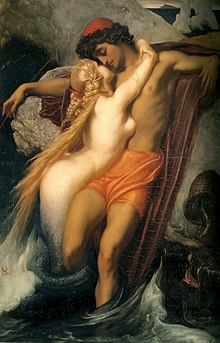The fisherman (Goethe)
Der Fischer is a short ballad by Johann Wolfgang von Goethe from 1779.
content

The ballad is about a fisherman sitting on the bank fishing when a mermaid appears in front of him and lures him into the depths with song and words.
The water rushed, the water swelled,
a fisherman sat by it,
looked calmly at the fishing rod,
cool to the heart.
And as he sits and as he listens,
the tide splits upwards:
A damp woman
rushes out of the moving water
.
She sang to him, she said to him:
"What do you lure my brood
With human
wit and cunning Up into the glow of death?
Oh, would you know what a little fish is like.
So comfortable on the bottom,
you descended as you are,
and would only get well.
Doesn't the dear sun refresh itself, the
moon not refresh itself in the sea?
Doesn't her face come back, breathing waves,
twice more beautiful?
Doesn't the deep sky
lure you, The moist blue?
Doesn't your own face lure you
here into eternal dew? ”
The water rushes, the water swells,
wets his bare foot;
His heart grew as longing
for him as with the dearest greeting.
She spoke to him, she sang to him;
It was all about him;
She half pulled him, half sank
and was no longer seen.
construction
The ballad consists of cross rhymes and three- to four-part iambs in four stanzas of eight verses each: an opening stanza (The Fisherman on the Shore and the Appearance of the Sea Woman), two middle stanzas (The Singing of the Sea Woman) and a final stanza (The overwhelming of the fisherman through the sea woman and her own desire to marry the moist element ).
The first stanza, "The water rushes, the water swells," forms a kind of basic chord that is resumed in the last stanza. Another characteristic are parallelisms and repetitions: "And how he sits and how he listens [...] " , "She sang to him, she spoke to him [...] " , "With human wit and cunning [...] " , "Refresh yourself [...] not, returns [...] not attracts you [...] not [...] " , " half they pulled him, he half sank [...] " . They convey a certain urgency.
The poem has a balanced rhythm, the iambic four-lifter symbolizes the rise and fall of the water. The caesuras after the 2nd, 4th, 6th and 8th verse of the 1st, 3rd and fourth stanzas reinforce the impression of calm and tension.
interpretation
The fisherman sitting on the bank is ready, although he is "cool to the heart", to experience the mysterious and magical power of the water flowing in front of him. The mermaid rising in front of him can therefore be interpreted as his mental situation, so he has already been spellbound by the evocative power of the water. The gentle wave movement that reaches the bank and finally wets his foot, the rustling and swelling of the water masses, has captured his senses . He is fascinated by the cool, glittering surface of water, in which the sun, sky and his own face are reflected.
The erotic only sounds very soft. The mermaid, the “wet woman”, love and attraction at the same time, is above all the incarnation of the mysterious power of water. Your half sung, half spoken words match the fisherman's mental state. Just as the mermaid is a symbol of the magical powers of nature, he is a symbol of the human being who becomes one with nature. The closing words of the mermaid "Doesn't your own face lure you into eternal dew ?" Express this clearly.
Viewed from this point of view, the mermaid seems less of a real natural being than a creation of the fisherman's imagination , in reality not existing, but only tangible as inspiration . The lure of the moving water would be in the fisherman himself. He gives in to his own desire to “get down to the bottom” and get “healthy”. That means shedding all burdens and troubles of the earthly, abandoning "human wit and cunning" and connecting with the "eternal".
Goethe himself said of his ballad: “In this ballad only the feeling of the water is expressed, the graceful thing that attracts us to bathe in summer; there is nothing else in it. "
Settings
The naturally demonically fascinating ballad was set to music several times, including by Carl Loewe , Franz Schubert , Anton Emil Titl , Hector Berlioz , Achim Reichel ( rain ballad ) and by the will-o'-the-wisps .
Visual arts
Between 1856 and 1858 created Frederic Leighton, 1st Baron Leighton with explicit reference to Goethe's poem, the painting The Fisherman and the Syren ( The Fisherman and the Siren ), which is on display at the Bristol City Museum and Art Gallery today.
literature
- Karl Moritz: German ballads - analyzes for German lessons . Paderborn 1972, ISBN 3506728148
Web links
- Spoken version at vorleser.net
- Page at the time of creation
- Analysis and interpretation ( Memento from January 14, 2012 in the Internet Archive )